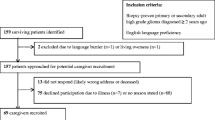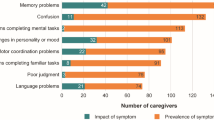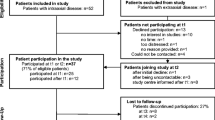Abstract
Purpose
Caregivers of patients with malignant gliomas are at risk for psychological distress. However, factors associated with distress in this population have not been well described. We conducted a prospective study evaluating psychological distress in patients with malignant gliomas and their caregivers and exploring factors associated with caregiver distress.
Methods
We enrolled patients with newly diagnosed malignant gliomas (N = 77) and their caregivers (N = 61). At baseline and 3, 6, and 9 months after diagnosis, we administered the Hospital Anxiety and Depression Scale to assess psychological distress and the Caregiver Reaction Assessment to evaluate caregiver burden. We performed multivariable regression analyses to investigate caregiver-related, patient-related, and tumor-related factors associated with caregivers’ distress.
Results
At baseline, 48.3% (29/60) and 26.2% (16/61) of caregivers reported clinically significant anxiety and depression symptoms, respectively. Anxiety and depression symptoms persisted over time. Greater caregiver depression was associated with male gender (B = 1.48, 95% CI 0.16–2.81, p = 0.03), higher caregiver burden (B = 0.08, 95% CI 0.01–0.15, p = 0.02), caregiver anxiety (B = 0.53, 95% CI 0.38–0.68, p < 0.0001), patient depression (B = 0.34, 95% CI 0.13–0.55, p = 0.002), and caring for a younger patient (B = −0.07, 95% CI −0.15 to 0.00, p = 0.049). Factors associated with greater caregiver anxiety symptoms were caregiver depression (B = 0.91, 95% CI 0.71–1.12, p < 0.0001) and younger patient age (B = −0.15, 95% CI −0.24 to −0.05, p = 0.003).
Conclusion
Male gender, higher caregiver burden, greater patient depression symptoms, and younger patient age are associated with increased distress among caregivers of patients with malignant gliomas, underscoring the need for tailored supportive care interventions targeting caregivers at highest risk for psychological distress.



Similar content being viewed by others
Data availability
The data that supports the findings of this study are available within the article, with any additional supporting data available from the corresponding author upon request.
References
Applebaum AJ, Kryza-Lacombe M, Buthorn J, DeRosa A, Corner G, Diamond EL (2016) Existential distress among caregivers of patients with brain tumors: a review of the literature. Neuro-Oncol Pract 3(4):232–244. https://doi.org/10.1093/nop/npv060
Kreutzer JS, Gervasio AH, Camplair PS (1994) Patient correlates of caregivers’ distress and family functioning after traumatic brain injury. Brain Inj 8(3):211–230. https://doi.org/10.3109/02699059409150974
Arber A, Faithfull S, Plaskota M, Lucas C, de Vries K (2010) A study of patients with a primary malignant brain tumour and their carers: symptoms and access to services. Int J Palliat Nurs. 16(1):24–30. https://doi.org/10.12968/ijpn.2010.16.1.46180
Zwinkels H, Dirven L, Vissers T, Habets EJJ, Vos MJ, Reijneveld JC et al (2016) Prevalence of changes in personality and behavior in adult glioma patients: a systematic review. Neuro-Oncol Pract 3(4):222–231. https://doi.org/10.1093/nop/npv040
Boele FW, Heimans JJ, Aaronson NK, Taphoorn MJ, Postma TJ, Reijneveld JC et al (2013) Health-related quality of life of significant others of patients with malignant CNS versus non-CNS tumors: a comparative study. J Neurooncol 115(1):87–94. https://doi.org/10.1007/s11060-013-1198-z
Russell B, Collins A, Dowling A, Dally M, Gold M, Murphy M et al (2016) Predicting distress among people who care for patients living longer with high-grade malignant glioma. Support Care Cancer 24(1):43–51. https://doi.org/10.1007/s00520-015-2739-0
Halkett GK, Lobb EA, Shaw T, Sinclair MM, Miller L, Hovey E et al (2017) Distress and psychological morbidity do not reduce over time in carers of patients with high-grade glioma. Support Care Cancer 25(3):887–893. https://doi.org/10.1007/s00520-016-3478-6
Collins A, Lethborg C, Brand C, Gold M, Moore G, Sundararajan V et al (2014) The challenges and suffering of caring for people with primary malignant glioma: qualitative perspectives on improving current supportive and palliative care practices. BMJ Support Palliat Care 4(1):68–76. https://doi.org/10.1136/bmjspcare-2012-000419
Kent EE, Mollica MA, Dionne-Odom JN, Ferrer RA, Jensen RE, Ornstein KA et al (2020) Effect of instrumental support on distress among family caregivers: findings from a nationally representative study. Palliat Support Care 18(5):519–527. https://doi.org/10.1017/S1478951520000036
Ketcher D, Trettevik R, Vadaparampil ST, Heyman RE, Ellington L, Reblin M (2020) Caring for a spouse with advanced cancer: similarities and differences for male and female caregivers. J Behav Med 43(5):817–828. https://doi.org/10.1007/s10865-019-00128-y
Berg A, Palomaki H, Lonnqvist J, Lehtihalmes M, Kaste M (2005) Depression among caregivers of stroke survivors. Stroke 36(3):639–643. https://doi.org/10.1161/01.STR.0000155690.04697.c0
Oechsle K, Ullrich A, Marx G, Benze G, Heine J, Dickel LM et al (2019) Psychological burden in family caregivers of patients with advanced cancer at initiation of specialist inpatient palliative care. BMC Palliat Care 18(1):102. https://doi.org/10.1186/s12904-019-0469-7
Petruzzi A, Finocchiaro CY, Lamperti E, Salmaggi A (2013) Living with a brain tumor : reaction profiles in patients and their caregivers. Support Care Cancer 21(4):1105–1111. https://doi.org/10.1007/s00520-012-1632-3
Choi CW, Stone RA, Kim KH, Ren D, Schulz R, Given CW et al (2012) Group-based trajectory modeling of caregiver psychological distress over time. Ann Behav Med 44(1):73–84. https://doi.org/10.1007/s12160-012-9371-8
Guevara AB, Demonet JF, Polejaeva E, Knutson KM, Wassermann EM, Grafman J et al (2016) Association between traumatic brain injury-related brain lesions and long-term caregiver burden. J Head Trauma Rehabil 31(2):E48-58. https://doi.org/10.1097/HTR.0000000000000151
Hashimoto A, Matsuoka K, Yasuno F, Takahashi M, Iida J, Jikumaru K et al (2017) Frontal lobe function in elderly patients with Alzheimer’s disease and caregiver burden. Psychogeriatrics 17(4):267–272. https://doi.org/10.1111/psyg.12231
McGurk R, Kneebone II (2013) The problems faced by informal carers to people with aphasia after stroke: a literature review. Aphasiology 27(7):765–783. https://doi.org/10.1080/02687038.2013.772292
Schulz R, Beach SR (1999) Caregiving as a risk factor for mortality: the Caregiver Health Effects Study. JAMA 282(23):2215–2219. https://doi.org/10.1001/jama.282.23.2215
Schulz R, Sherwood PR (2008) Physical and mental health effects of family caregiving. Am J Nurs. 108(9 Suppl):23–7. https://doi.org/10.1097/01.NAJ.0000336406.45248.4c (quiz 7)
Boele FW, Given CW, Given BA, Donovan HS, Schulz R, Weimer JM et al (2017) Family caregivers’ level of mastery predicts survival of patients with glioblastoma: a preliminary report. Cancer 123(5):832–840. https://doi.org/10.1002/cncr.30428
Dionne-Odom JN, Hull JG, Martin MY, Lyons KD, Prescott AT, Tosteson T et al (2016) Associations between advanced cancer patients’ survival and family caregiver presence and burden. Cancer Med 5(5):853–862. https://doi.org/10.1002/cam4.653
Hudson PL, Aranda S, Kristjanson LJ (2004) Meeting the supportive needs of family caregivers in palliative care: challenges for health professionals. J Palliat Med 7(1):19–25. https://doi.org/10.1089/109662104322737214
Zigmond AS, Snaith RP (1983) The hospital anxiety and depression scale. Acta Psychiatr Scand 67(6):361–370
Bjelland I, Dahl AA, Haug TT, Neckelmann D (2002) The validity of the Hospital Anxiety and Depression Scale. An updated literature review. J Psychosom Res. 52(2):69–77
Given CW, Given B, Stommel M, Collins C, King S, Franklin S (1992) The caregiver reaction assessment (CRA) for caregivers to persons with chronic physical and mental impairments. Res Nurs Health 15(4):271–283
Grov EK, Fossa SD, Tonnessen A, Dahl AA (2006) The caregiver reaction assessment: psychometrics, and temporal stability in primary caregivers of Norwegian cancer patients in late palliative phase. Psychooncology 15(6):517–527. https://doi.org/10.1002/pon.987
Geng HM, Chuang DM, Yang F, Yang Y, Liu WM, Liu LH et al (2018) Prevalence and determinants of depression in caregivers of cancer patients: a systematic review and meta-analysis. Medicine (Baltimore) 97(39):e11863. https://doi.org/10.1097/MD.0000000000011863
Hu P, Yang Q, Kong L, Hu L, Zeng L (2018) Relationship between the anxiety/depression and care burden of the major caregiver of stroke patients. Medicine (Baltimore) 97(40):e12638. https://doi.org/10.1097/MD.0000000000012638
Karabekiroglu A, Demir EY, Aker S, Kocamanoglu B, Karabulut GS (2018) Predictors of depression and anxiety among caregivers of hospitalised advanced cancer patients. Singapore Med J. 59(11):572–7. https://doi.org/10.11622/smedj.2018066
Ownsworth T, Henderson L, Chambers SK (2010) Social support buffers the impact of functional impairments on caregiver psychological well-being in the context of brain tumor and other cancers. Psychooncology 19(10):1116–1122. https://doi.org/10.1002/pon.1663
Vittinghoff E, Glidden D, Shiboski S, McCulloch C (2012) Regression methods in biostatistics: linear, logistic, survival, and repeated measures models. Springer, New York
Moser MT, Kunzler A, Nussbeck F, Bargetzi M, Znoj HJ (2013) Higher emotional distress in female partners of cancer patients: prevalence and patient-partner interdependencies in a 3-year cohort. Psychooncology 22(12):2693–2701. https://doi.org/10.1002/pon.3331
Nipp RD, El-Jawahri A, Fishbein JN, Gallagher ER, Stagl JM, Park ER et al (2016) Factors associated with depression and anxiety symptoms in family caregivers of patients with incurable cancer. Ann Oncol 27(8):1607–1612. https://doi.org/10.1093/annonc/mdw205
Dionne-Odom JN, Demark-Wahnefried W, Taylor RA, Rocque GB, Azuero A, Acemgil A et al (2017) The self-care practices of family caregivers of persons with poor prognosis cancer: differences by varying levels of caregiver well-being and preparedness. Support Care Cancer 25(8):2437–2444. https://doi.org/10.1007/s00520-017-3650-7
Lamers F, van Oppen P, Comijs HC, Smit JH, Spinhoven P, van Balkom AJ et al (2011) Comorbidity patterns of anxiety and depressive disorders in a large cohort study: the Netherlands Study of Depression and Anxiety (NESDA). J Clin Psych 72(3):341–348. https://doi.org/10.4088/JCP.10m06176blu
Kalin NH (2020) The critical relationship between anxiety and depression. Am J Psych 177(5):365–367. https://doi.org/10.1176/appi.ajp.2020.20030305
Jacobs JM, Shaffer KM, Nipp RD, Fishbein JN, MacDonald J, El-Jawahri A et al (2017) Distress is interdependent in patients and caregivers with newly diagnosed incurable cancers. Ann Behav Med 51(4):519–531. https://doi.org/10.1007/s12160-017-9875-3
Braun SE, Aslanzadeh FJ, Thacker L, Loughan AR (2021) Examining fear of cancer recurrence in primary brain tumor patients and their caregivers using the actor-partner interdependence model. Psychooncology 30(7):1120–1128. https://doi.org/10.1002/pon.5659
Aoun SM, Deas K, Howting D, Lee G (2015) Exploring the support needs of family caregivers of patients with brain cancer using the CSNAT: a comparative study with other cancer groups. PLoS ONE 10(12):e0145106. https://doi.org/10.1371/journal.pone.0145106
Swore Fletcher BA, Dodd MJ, Schumacher KL, Miaskowski C (2008) Symptom experience of family caregivers of patients with cancer. Oncol Nurs Forum 35(2):E23-44. https://doi.org/10.1188/08.ONF.E23-E44
Xiong C, Biscardi M, Astell A, Nalder E, Cameron JI, Mihailidis A et al (2020) Sex and gender differences in caregiving burden experienced by family caregivers of persons with dementia: a systematic review. PLoS ONE 15(4):e0231848. https://doi.org/10.1371/journal.pone.0231848
Gervasio AH, Kreutzer JS (1997) Kinship and family members’ psychological distress after traumatic brain injury: a large sample study. J Head Traum Rehab 12(3):14–26
Kozachik SL, Given CW, Given BA, Pierce SJ, Azzouz F, Rawl SM et al (2001) Improving depressive symptoms among caregivers of patients with cancer: results of a randomized clinical trial. Oncol Nurs Forum 28(7):1149–1157
Zou P, Xu H, Chen P, Yan Q, Zhao L, Zhao P et al (2013) IDH1/IDH2 mutations define the prognosis and molecular profiles of patients with gliomas: a meta-analysis. PLoS ONE 8(7):e68782. https://doi.org/10.1371/journal.pone.0068782
Hahn CA, Dunn RH, Logue PE, King JH, Edwards CL, Halperin EC (2003) Prospective study of neuropsychologic testing and quality-of-life assessment of adults with primary malignant brain tumors. Int J Radiat Oncol Biol Phys 55(4):992–999. https://doi.org/10.1016/s0360-3016(02)04205-0
Funding
This study was supported by the Pappas Center for Neuro-Oncology and the Cancer Outcomes Research and Education Program at the Massachusetts General Hospital Cancer Center. Dr. El-Jawahri is a Scholar in Clinical Research for the Leukemia and Lymphoma Society.
Author information
Authors and Affiliations
Contributions
Deborah Forst: conceptualization, formal analysis, investigation, methodology, writing — original draft and writing — review and editing. Alyx Podgurski: formal analysis, writing — review and editing. Kit Quain: investigation, data curation, writing — review and editing. Sophia Landay: investigation, data curation, writing — review and editing. Maya Anand: investigation, data curation, writing — review and editing. Emilia Kaslow-Zieve: formal analysis, writing — review and editing. Michelle Mesa: formal analysis, writing — review and editing. Jamie Jacobs: methodology, writing — review and editing. Michael Parsons: methodology, writing — review and editing. Jorg Dietrich: conceptualization, writing — review and editing. Nora Horick: formal analysis, writing — review and editing. Joseph Greer: methodology, writing — review and editing. Tracy Batchelor: conceptualization, writing — review and editing. Vicki Jackson: conceptualization, writing — review and editing. Areej El-Jawahri: methodology, supervision, formal analysis, writing — review and editing. Jennifer Temel: conceptualization, methodology, supervision, writing — review and editing.
Corresponding author
Ethics declarations
Ethics approval
This study was approved by The Dana-Farber/Harvard Cancer Center Institutional Review Board and was performed in accordance with the ethical standards as laid down in the 1964 Declaration of Helsinki.
Consent to participate
All participants provided written informed consent prior to enrollment.
Consent for publication
All authors have approved the final version of this manuscript.
Conflict of interest
Dr. Forst: ownership interest in Eli Lilly. Dr. Parsons: consultant fees from Agios Pharmaceuticals and Gamaka Biotechnology, royalties from the American Psychological Association Press. Dr. Greer: research funding from Blue Note Therapeutics, royalties from Humana Press/Springer. Dr. El-Jawahri: consultant fees from AIM Specialty and Blue Note Therapeutics. Dr. Batchelor: Genomicare scientific advisory board. Remaining authors: no disclosures.
Additional information
Publisher's note
Springer Nature remains neutral with regard to jurisdictional claims in published maps and institutional affiliations.
Supplementary Information
Below is the link to the electronic supplementary material.
520_2022_6989_MOESM1_ESM.pdf
Supplementary file1 (PDF 36 KB) Online Resource 1. CRA Subscale Scores and Correlation with Caregiver Depression and Anxiety. Analyses of the correlation between caregiver burden as measured by the CRA subscale scores and caregiver distress (depression and anxiety) as measured by the HADS demonstrate that caregiver burden as related to impact on schedule, lack of family support, impact on health and impact on finances was significantly correlated with caregiver depression and caregiver anxiety
520_2022_6989_MOESM2_ESM.pdf
Supplementary file2 (PDF 66 KB) Online Resource 2. Multivariable analyses of patient-related factors associated with caregivers’ depression symptoms at baseline. In the multivariable model, younger patient age and higher patient depression symptoms were significantly associated with caregiver depression at baseline
520_2022_6989_MOESM3_ESM.pdf
Supplementary file3 (PDF 67 KB) Online Resource 3. Multivariable analyses of patient-related factors associated with caregivers’ anxiety symptoms at baseline. In the multivariable analysis, younger patient age was significantly associated with higher caregiver anxiety symptoms at baseline
Rights and permissions
About this article
Cite this article
Forst, D., Podgurski, A., Quain, K. et al. Factors associated with psychological distress in caregivers of patients with malignant gliomas. Support Care Cancer 30, 5811–5820 (2022). https://doi.org/10.1007/s00520-022-06989-5
Received:
Accepted:
Published:
Issue Date:
DOI: https://doi.org/10.1007/s00520-022-06989-5




